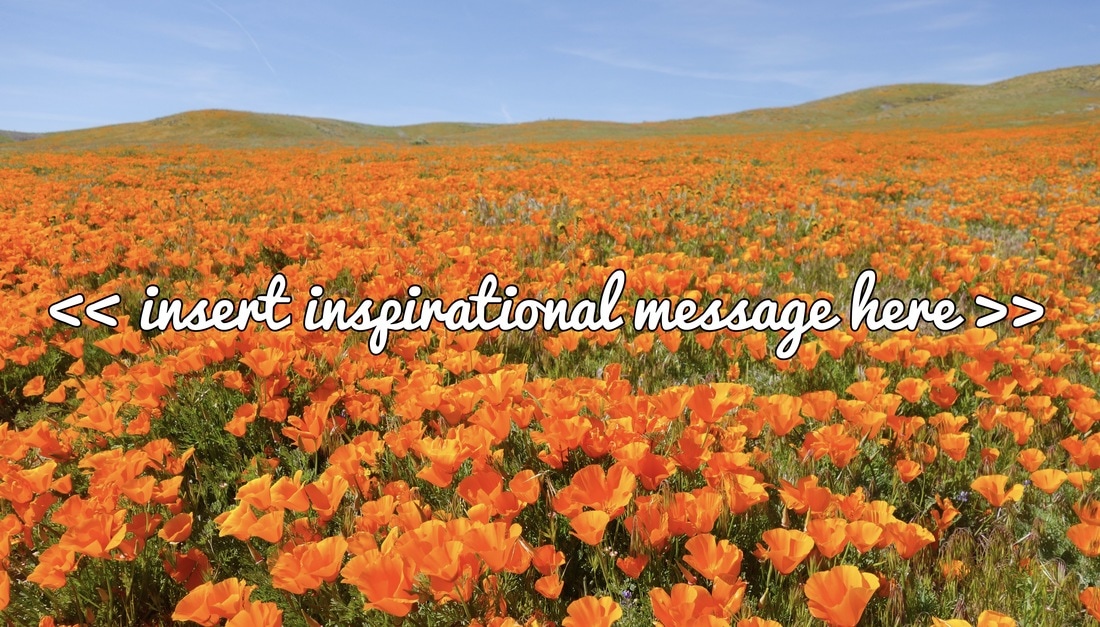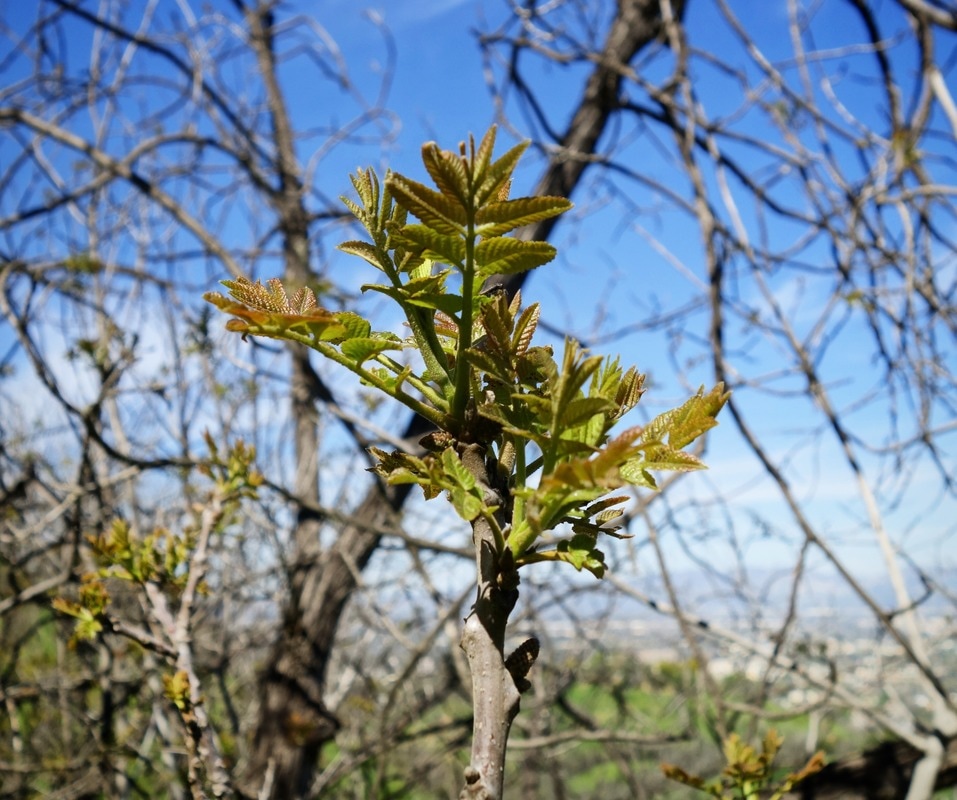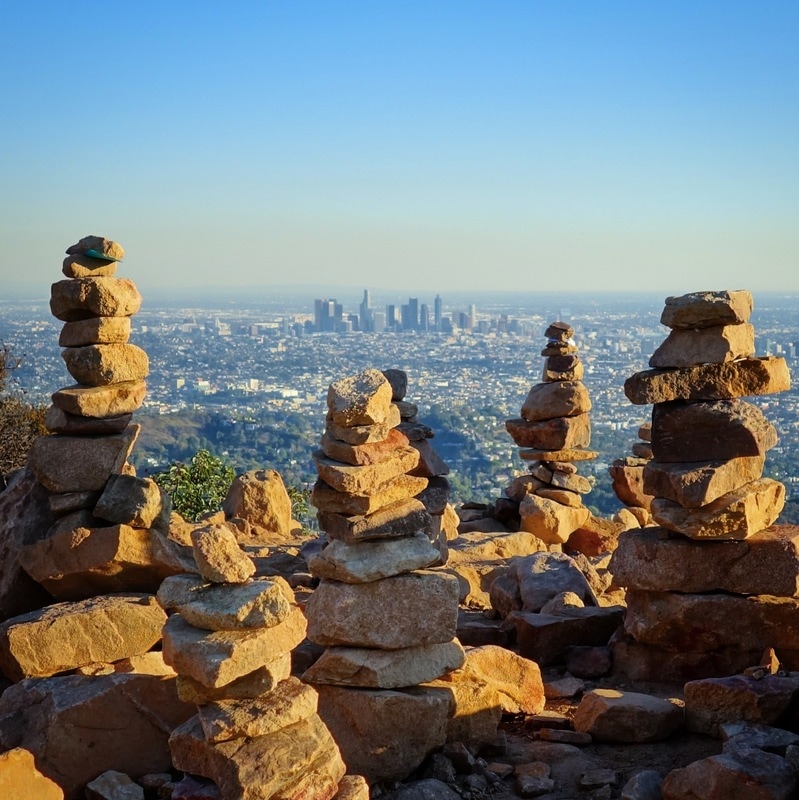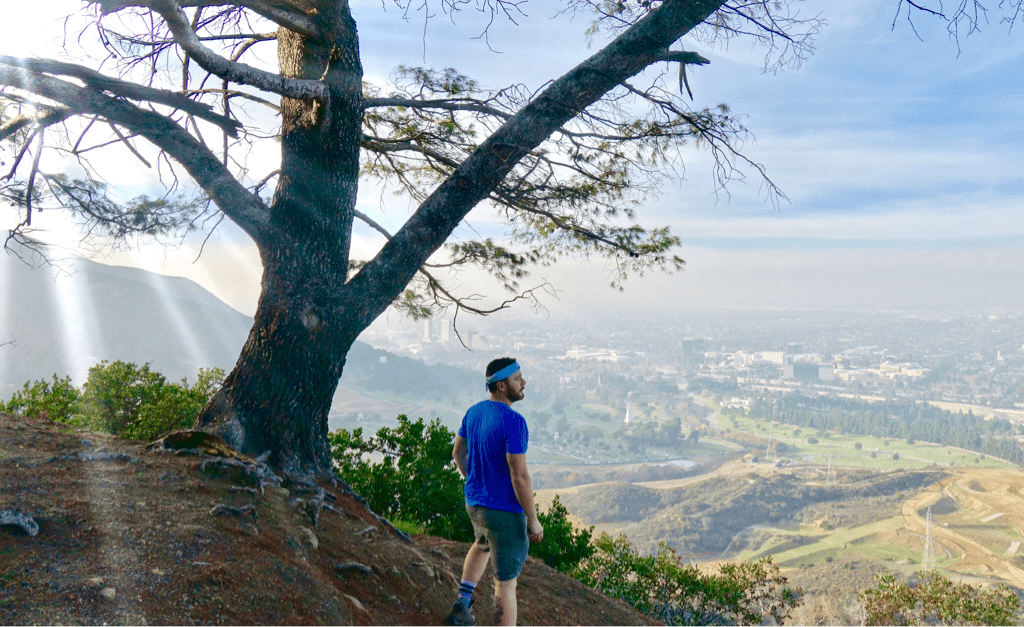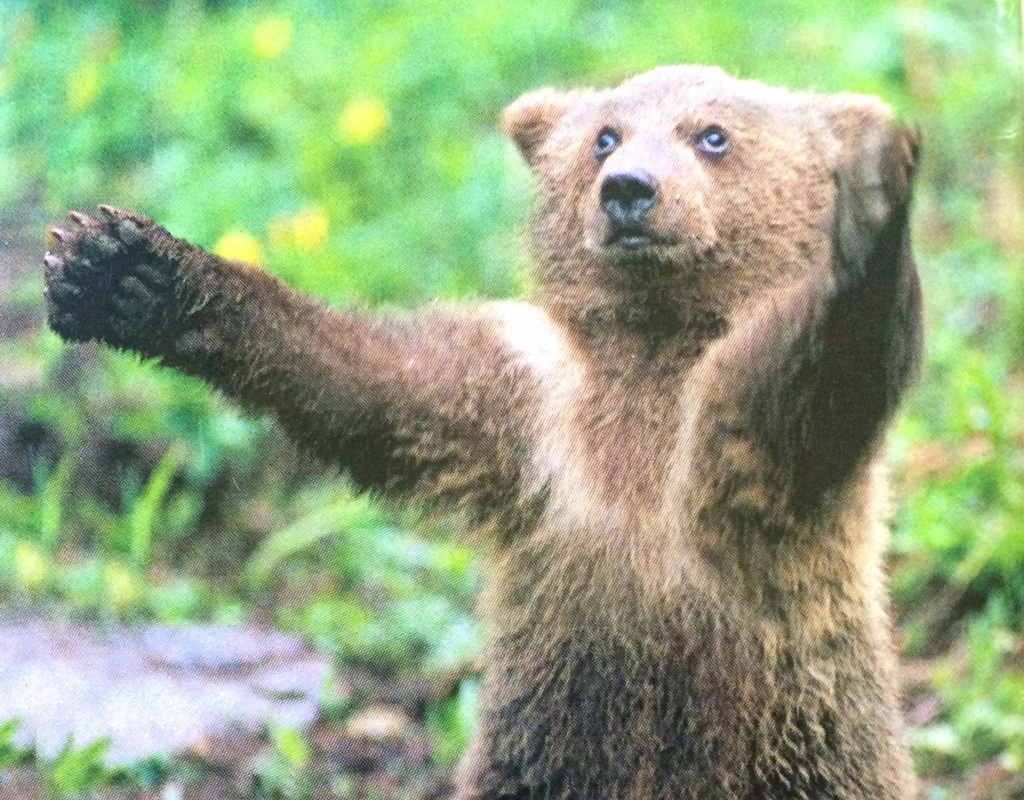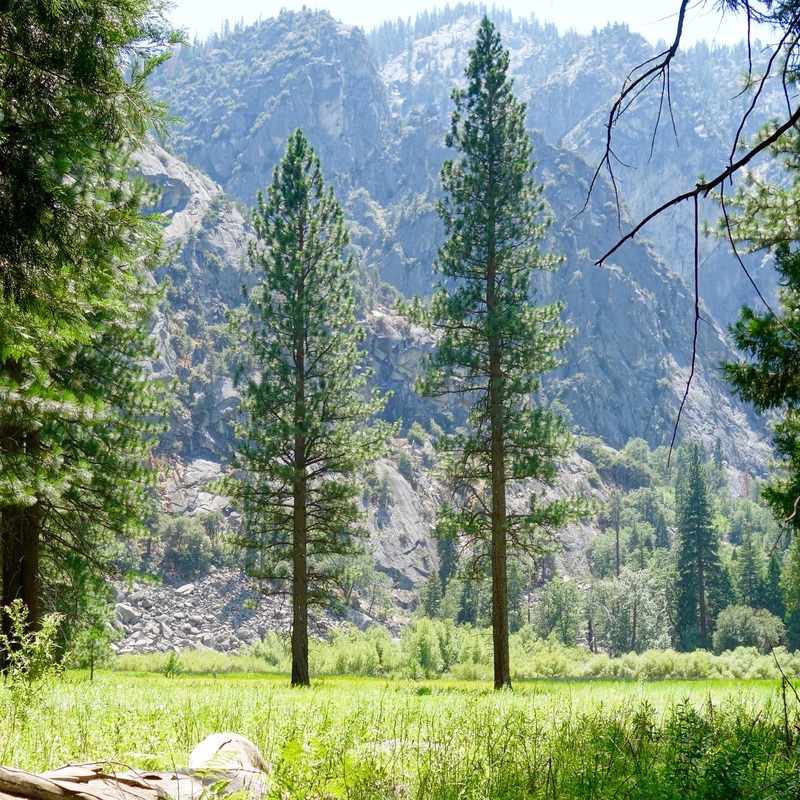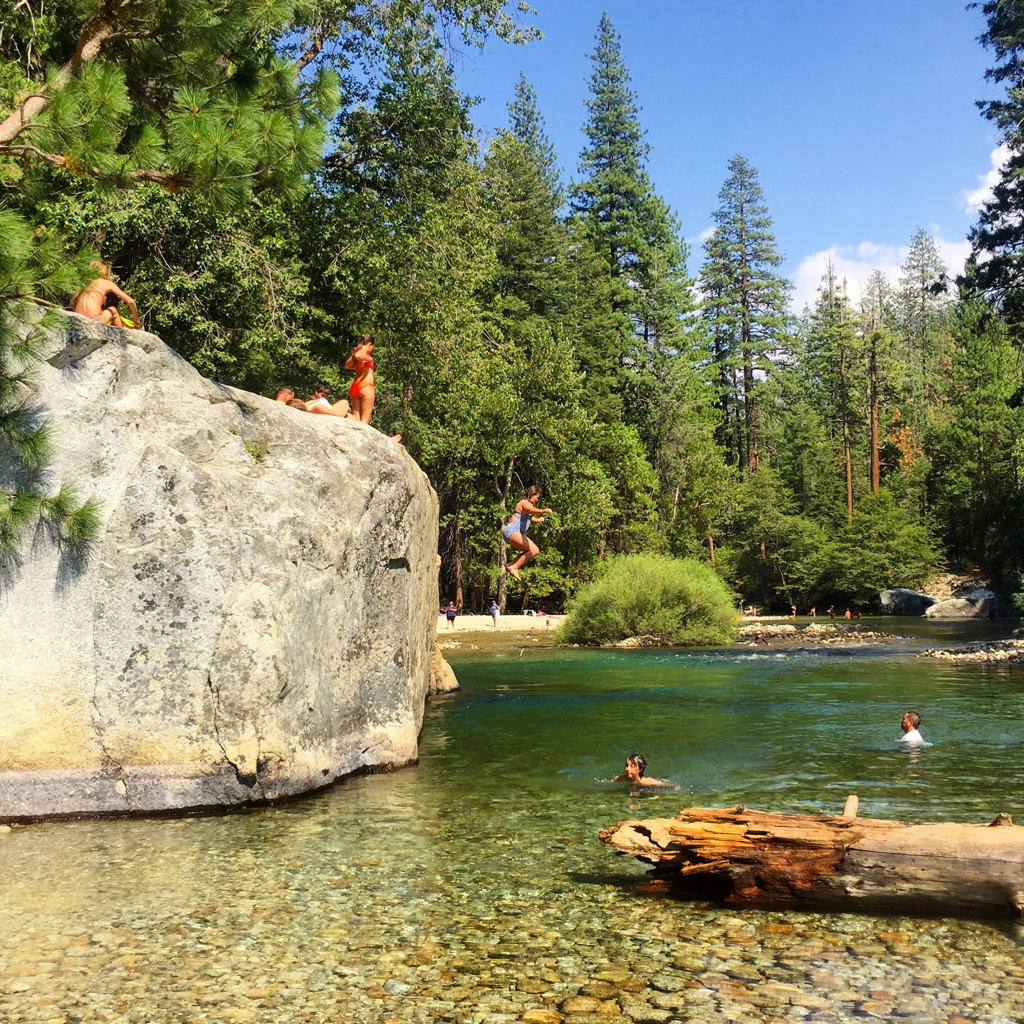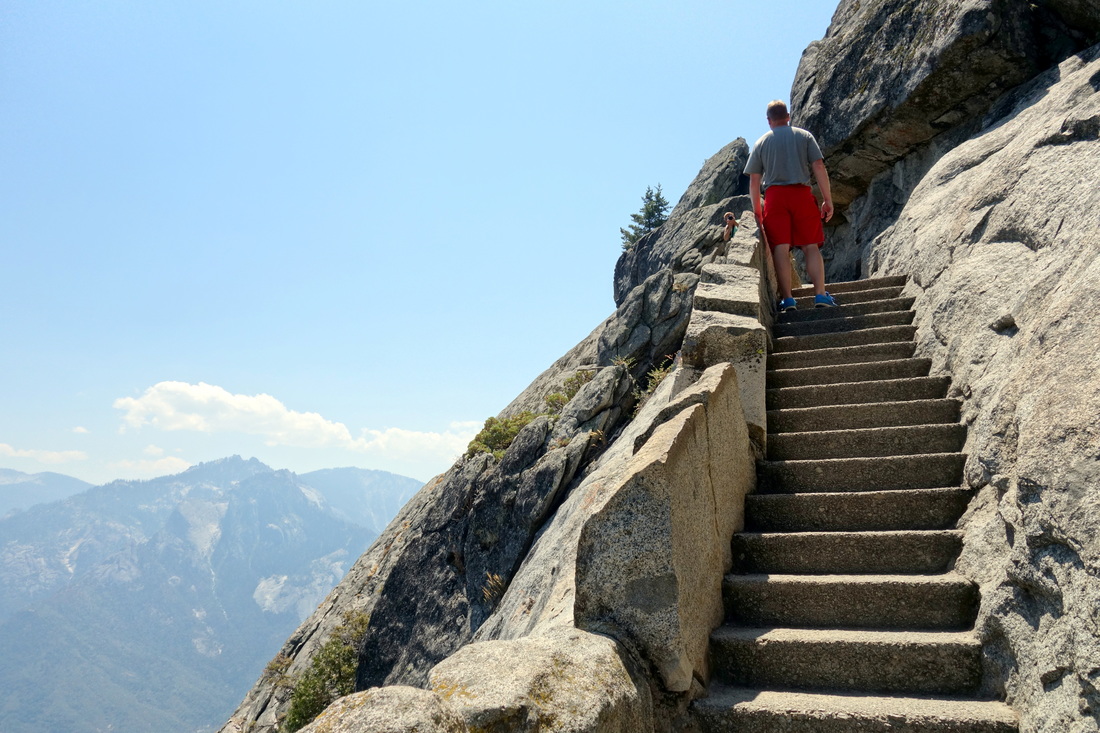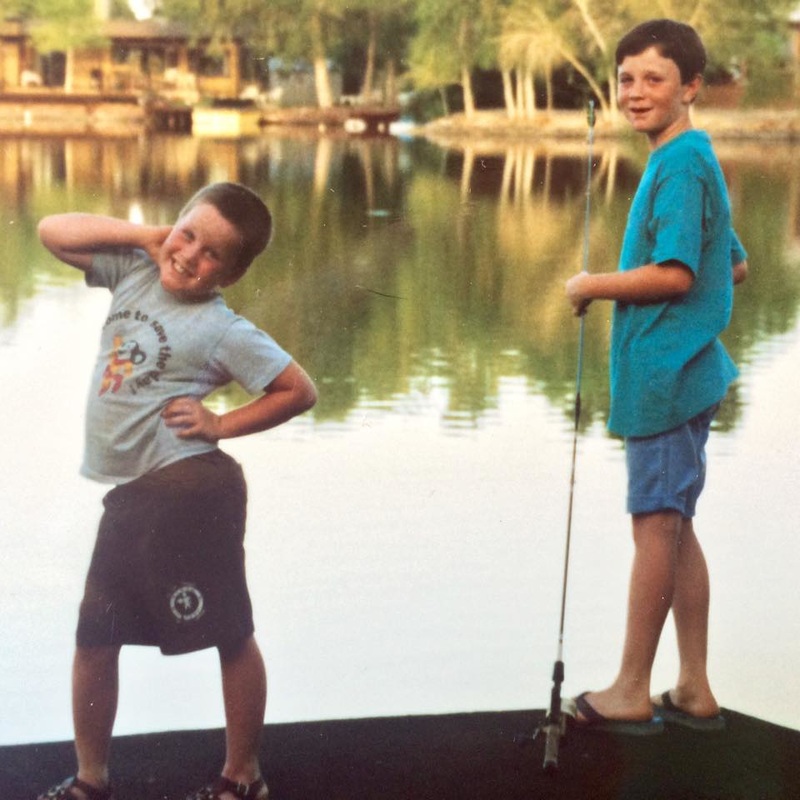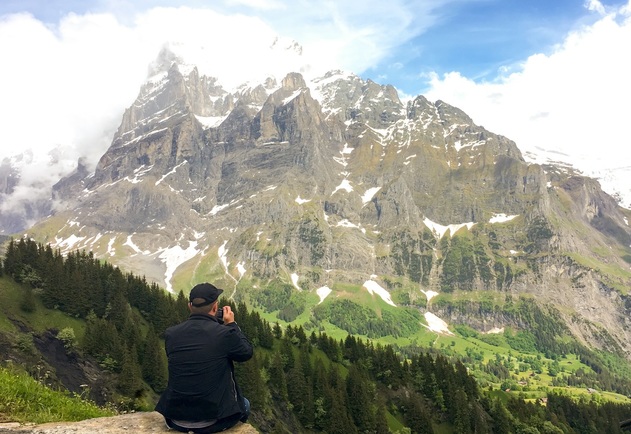Less v. More
2/1/2018
Less us, more we.
Less why, more be. Less posting, more protesting. Less complaining, more changing. Less conquest, more progress. Less complicitness, more kindness. Less pontificating, more creating. Less waiting, more cultivating. Less worry, more wonderment. Less hurry, more movement. Less cursing, more caring. Less doubting, more doing. Less regret, more reflect. Less elect, more effect. Less reaction, more action. Less apathy, more activism. Less us, more we. Less blinders, more see. Respect Your Park, Leave No Trace
6/15/2017
Graffiti in a National Monument. Sadly, it’s a thing.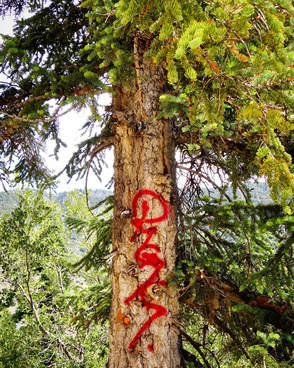 I mean, what did this tree ever do to you? I mean, what did this tree ever do to you? I do a lot of hiking around Los Angeles, and it’s inevitable that I see vandalism. Damaged structures, stickers on signs, trampled plants, trash on the trail — every glimpse of destruction breaks my heart a little. It’s all so avoidable if we all just take little responsibility for ourselves and follow a few Leave No Trace principles. But what I saw in the San Gabriel Mountains National Monument at the Big Horn Mine Trail was especially egregious — an explosion of obviously illegal graffiti. Street art can be beautiful in the right environment, especially if there’s a cultural or political message behind it, and it’s part of what makes our cities so vibrant. But the a street and a trail are very different places. But when you see graffiti not just in nature, but on nature, it’s jarring — it plucks you out of that indescribably perfect environmentality and tosses you back into the mucky pond of self indulgent humanity. There’s no relevant artistic value to it, it’s disrespectful to our planet, and offensive to all those of us who want to see this planet protected. Here’s a sampling of the hideous sights you’ll see on the trail: Look, I get it, the more people tag a trail the more it seems like an acceptable, maybe even fun, idea. And I’m aware that this trail has been cleaned up before, only to be tagged again. So let’s be grown ups for a minute. Let’s take some responsibility for ourselves, our park, our San Gabriel Mountains National Monument.
This particular National Monument is currently up for review by the anti-environmental zealots in White House, so its future is on shaky ground. That means it’s up to us to protect this natural beauty for future generations. That protection starts with you, and all of us, and me too. First step is telling the Department of Interior how important this and other National Monuments are to all of us. Second step is proving how important this National Monument is to us by cleaning up this trail and keeping it that way for all future visitors. Send me a message if you want to help with a trail clean up, and follow Trash Free Earth on social media to see how you can get more involved with regular events. This is our park, we have to defend it! Snap Out of It.
3/28/2017
Hey you. Yeah you over there. The one moping around with your head to the ground. The one so easy to irritate. The one putting your frustration on blast.
You, the one who’s day didn’t go well. Had to sit in too much traffic. Endured a boring meeting. Tickets sold out for the only show. Forced to mop up midnight dog vom. Got in a fight with a friend. Have friends but sometimes feel abandoned. Your instagram didn’t get enough likes. Ex posted too many happy instagrams. Ran out of money before your paycheck. Bought something expensive but didn’t feel fulfilled. Had a little too much fun last night. Didn’t have enough fun. Didn’t get the job you wanted. Didn’t get the guy you chased. Ended a relationship. Trapped in a relationship that won’t end. Finished another day of life sleepwalking. Hoped to sleepwalk but forced to participate. Again. And repeat. That sucks, I get it, but you’re letting that shit hold you back. You need to snap out of it.
Snap. Out of. It.
When we sulk and wallow and bemoan all the terrible things in life, we perpetuate all those terrible things. When we distract ourselves away from progress, we do so at the expense of progressing. When we let it all get the better of us, a problem become paralyzation. Yeah, life sucks sometimes. Jobs, dogs, strangers, and even friends will inevitably drag you down, one way or another. In the history of all humanity, never is a life lived unequivocally — no life is flawless, faultless, or entirely fair. But no matter how much debris is swirling around your storm drain, you own the tools to clean it up. No matter how bad you feel today, you always have tomorrow. No matter how many mistakes you’ve made, you can always learn from them. No matter how many mistakes are made by politicians, there’s always another election. No matter how many times people dumped on you today, you are always in charge of your own destiny, and attitude, and smile. Snap. Out of. It. Next time you’re wallowing in the muck of a disappointing life, pause, take a deep breath, give yourself a hearty Cher slap, and snap out of it. Put your focus back on the beautiful world around you — start creating beauty. It's Never Over
3/4/2017
I'm 37 and always feel like I'm just getting started in life.
I’ve felt like I was just getting started for pretty much all of those 37 years, and it has its pluses and minuses. On one hand, it can easily lead to malaise--if you’re always just getting started, it’s easy to feel adrift. But on the other, I like the idea of new beginnings--when every day is an opportunity to start again, every day has hope. That's because it's not over. It’s not over for me. I’m still figuring it out, trying new things, pushing myself, often failing, but then picking myself up and learning from it. It’s not over for you either. You don’t have to have it all figured out. You just have to try new things, push yourself, and pick yourself up, so you can learn and grow into the future. Each day is the start of a new path of possibility. Whether we take that path and how far we travel down we travel is entirely up to us. It leads us forward, toward creating our legacy, toward ourselves. Look, I don’t always feel this way — I get bogged down in the day-to-day struggle of getting my act together too. After 37 laps around the sun, sometimes I run into a wall of exhaustion. I wrote this at one of those very moments. But I also know that when we stop to bemoan our lack of progress, we do so at the expense of progressing. So I wrote this because in that moment I needed a cheerleader to root me toward the finish line, even if that cheerleader was myself. I wrote this because I know once in a while you might need that cheerleader too. I know it’s not over, it's never over, because there’s always hope. I know that if I wake up every day and trudge forward that I’ll move forward. You know it too. That’s why you’re reading this. Build a beautiful relationship? It's not over. Land that dream job? It's not over. Cultivate happiness? It's not over. Lose those pesky 5 pounds? It's not over. Resolve a nagging conflict? It’s not over. Debt-free by 40? It’s not over. Abandon social media distraction? It's not over. Perfect your recipe for lemon squares? It’s not over. The battle for equality and progress? It’s not over. It’s not over because it each day is a new beginning. It’s not over because that beginning is your choice. It’s not over because that choice is one you get to make every day. The Power of Doing
1/6/2017
There's a dangerous passivity encouraged by the “power of positive thinking.” Cross-posted at: medium.com/the-mindful-journeyman/the-power-of-doing We’ve all heard of the “power of positive thinking”. It’s this idea that your destiny is controlled by your state of mind. Think a few happy thoughts and boom!, you’re happy.
There are multiple variations on this theme. Create a vision board to imagine an amazing future and boom!, the future becomes amazing. Meditate everyday and boom!, you have mindfulness in spades. Raise your arms in the air like you won a race one minute before an interview and boom!, you win and you’re hired (seriously, that’s a thing). I’m here to say, no. No to all of that. Thoughts are just that, thoughts. By definition they are only in your mind. They can be powerful forces to guide your life into happiness and success, but not by themselves. The only way for your thoughts to effect the actual world you live in is for you to do one very critical thing: act on them. There’s a dangerous passivity encouraged by this theory of the power of positive thinking. It gives us the impression that we can sit back, imagine our ideal life, and if we wish for it hard enough it we’ll watch it magically unfold. But that ideal life isn’t created by imagination, it’s created by doing. It’s built up over a series of difficult decisions and decisive actions. It’s a slowly visualized rainbow that is made up of the darkness failure, the light of success, and a thousand of gradients of unexpected color in between. Our thoughts and ideas are definitely important. Meditation, daily affirmations, setting an intention, thinking through the tough decisions in life, and thinking through our response to those around us, they are the foundation of our betterment. But ultimately, a simple idea is useless if we never put it into practice. Our life is realized when we build a structure on that foundation. And our happiness is determined by what we build. Or in short: what truly matters most isn’t what you think, it’s what you do with that thought. So use the power of your mind all you want. Ponder the meaning of life, brainstorm it, vision board it, talk to friends you trust, hire a life coach, whatever. But don’t stop there. Make a plan. Make multiple plans. Take action. See it through. Life will not be handed to you on a silver platter just because you dream up a silver platter. Your life is created by you. I know you're frustrated, I'm frustrated too. But guess what? There's hope. Cross-posted at: medium.com/the-mindful-journeyman I'm angry. I'm disappointed. Once in a while these days a wave inescapable melancholy washes over me. The events that have transpired across the world over the past year have been unmistakably heavy. I have a hunch that a lot of you feel the same.
2016 was a difficult year. Some would call it a terrible, horrific, never ending nightmare of a dumpster fire, but let’s just stick with “difficult” for the sake of sanity. Russia, Ukraine, Syria, ISIS, China, Russia again, the hottest year on record, the death of a slew of extremely talented artists, the dangerous proliferation of fake news, all the people with an uncritical eye who believe it, the 2016 presidential election season, the day of the 2016 presidential election itself, the day(s) after the 2016 presidential election, the hatred and racism it all exposed, and perhaps worst of all, the demagogue of destructive division that is president-elect Trump... just to name a few. This year piled it on like dirty laundry. Like rows of chipped plates at a Goodwill. Like net after net of suffocating fish on boat deck. It broke the Guinness World Record for awful years. But I’m going to tell you something you may not be expecting to hear: 2016 was amazing. That’s right, I said it. While it's true, there is a long list of terrible things that happened in 2016, there’s an even longer list of beautiful things: your friends, your family, all the mind-blowing things you learned and the stunning sights you witnessed, every meaningful conversation, every hug and every smooch, all the moments where you created, you cried, you smiled. Least of all, 2016 was an amazing year because you were here to live it. No matter how much the acidic fermentation of hatred, disapointment, and chaos soured this year, you survived it, you learned from it, and you’re better off for it. When things go downhill like they did in 2016—when we see cruelty, violence, ignorance, war, and struggle — it’s easy to just give up. Stick our heads in the sand of distraction and procrastination. Chalk this off as a rotten year, plug our noses, and pray that when we ring in 2017 and put up a new wall calendar it’s somehow going to fix everything. That is the exact opposite thing we should do. Wallowing in the darkness of the past doesn't make your future any brighter. The only way to do that is to mindfully stand in the light of the present. I’m still here ready and able to fight, you are too, and that gives me hope. It pulls me out of the funk of this past year and gets me back to work today, in the present. I know deep down that no matter how many terrible things happen, in this or any year, there are still good and decent people in the world. Our very existence proves it. You are lucky to be alive right now—we are all lucky to be alive right now—because as long as we’re alive, hope lives as well. That is the spark of inspiration that we use to ignite a better world. Instead of putting out the flame because things didn’t go our way, how about we use all this as fuel to burn even brighter, every day, from here on out? Instead of worrying about the lack of kindness in the world, how about we turn the tide by showing more kindness ourselves? Instead of fretting over the myriad ways our president-elect can screw up societal progress, the complex global economy, our increasingly tense international relations, and the environment, how about we volunteer and donate to the organizations that will pick up the fight in his absence? Instead of pouting while we wait for 2017 to somehow usher in better news, how about we create some good news right now while 2016 still exists? We are lucky to be alive because it means we still have a chance. Right now is your chance. Stand up, step forward, and take it. It’s OK to be Sad.
10/27/2016
"The more OK you are with being sad, the less sad you’ll be." 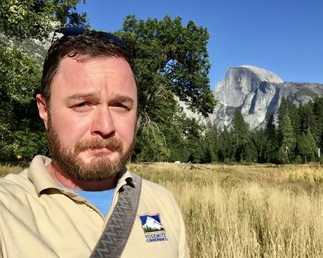 Leaving Yosemite after a month. Damn right I was sad. Nothing wrong with that. Not ashamed. Leaving Yosemite after a month. Damn right I was sad. Nothing wrong with that. Not ashamed. When was the last time you took a selfie while upset? No we don’t do that, we say “cheese” and smile for the camera. Or even if you don’t smile, you at least have to mug it up with a duck face or a bear smirk. When was the last time you saw someone walking down the street crying? If you did you probably thought they were a lunatic. And the last time you felt like crying in public you probably ran home so you could do it in private, like a “normal” person. Our society is ashamed of sadness, sadly. When at our saddest, we’ve been trained to hide it. At home we go to our room. At a funeral we put on sunglasses. At work or school we stake out a claim in a bathroom stall. Heaven forbid if you do cry or become emotional in public — everyone will think you need mental assistance. Speaking of, our society is ashamed of mental assistance too. Psychology is really just asking a trained professional for a little help with your mind. This blog is a very small act of me doing the same, for myself and maybe you. We all seek mental assistance in some way, be it through the distraction of entertainment, the introspection of music, with medication (prescribed and otherwise), with yoga or meditation, with mindfulness blogs (hi!), and yes, actual real-life therapy.
Western society demands we show control, at least in public. We have to be perky, on it, clever, and together, even when in reality we’re feeling like shit. And when you feel like shit, you act like a shit, and everyone around you starts to think you’re a shitty person. But I’ll let you in on a secret: it’s OK to be sad. It’s OK to be bummed about your life and its direction. It’s OK to feel heartbroken when a relationship doesn’t work out. It’s OK to end up depressed at the state of our political discourse. It’s OK to get pissed at a friend who let you down. It’s OK to be sad. It’s OK to cry. It’s real. You don’t have to hide it. The more we as a society learn to accept our emotions, all of them, as valid and true, the better we’ll get at handling them when they inevitably arise. I’m not saying that the next time you feel like crying you should walk out to the middle of a busy intersection and sob in front of all humanity, children included. But if you did happen to start crying there, so what. It’s how you’re feeling, and plus those kids cry all the time without remorse. Maybe we could learn a thing or two from kids. The best to handle your emotions is to accept them, not fight them. So get OK with being sad. The more OK you are with being sad, the less sad you’ll be. We habituate ourselves to expect certain things, to desire certain vices, to keep a certain schedule, and act a certain persona. It's just what we're used to. It’s what everyone around us is used to.
But that doesn't mean that's who we really are. Black bears in the wild of Yosemite eat berries, grass, and insects. Sometimes they eat animals like fish, but by and large, and especially when they don't feel threatened, they don’t hunt and they are docile creatures. They're kind of adorable when you see them sitting in a meadow, basking in the warm sun, furrowing the soft ground for a meal. They're like a real-life teddy bear, just one you probably shouldn’t hug. When black bears met humans, they started to learn a different way of life--they picked up a habit. People food is high in calories, and way more tasty and filling than meadow grass. So when we started to give them people food, as the supervisors of Yosemite did for decades, the bears quickly learned to follow the path of least resistance and eat up. Wild bears became habituated to a new human way of living, one that involved convincing people to give them food. If those people were unconvinced, simply steal it. If they got in the way of the food, take them out. First we habituated them, and then allowed our cavalier attitude to that habituation to bite us in the ass, literally. We learned our lesson, thankfully, and now we've engaged in a decades long effort to de-habitualize the black bear. We stopped feeding them for show at Yosemite, so bears would stop expecting it. We put our food in bear boxes instead of cars or coolers, so the bears learned they can’t get food at a campsite. A habit, any habit, is only a condition we've created. That goes for the habit bears learned from humans, and it goes for all the habits we’ve taken on ourselves. It's hard to break a habit, for sure. Bears still visit campgrounds because the food smells good and they’re curious. But the more we change our patterns, the more the habit breaks. In Yosemite, bear incidents are down 97% since 1996. Our continued vigilance in minding our food when we visit Yosemite will ensure this new pattern continues. Maybe we could learn something from the habituation, and subsequent dehabituation, of the black bear. Observe the patterns and expectations we or others place on ourselves. Try to find where we made the mistake and how we perpetuated it. Then imagine a path forward where we break the habit. Even when you think you’ve dehabitualized yourself, that doesn’t mean it can’t come back. Habits are much easier to make than to break. For bears at Yosemite these days, some still look for people food. Those that end up in a campsite get scared off with beanbag and paintball guns. If they come back they get tranquilized, tagged, and brought to a distant region of the park. If they come back a third time, euthanization. We have a lot more than three chances when it comes to our own bad habits, but eventually they will catch up to us. Those habitualizations of vice and character will eventually bite us in the ass just like the black bear. If you’re trying to break a bad habit or any other pattern, be strong, persistent, and patient. Overtime it’ll get easier. You don’t have to be "that guy" just because you have always been that guy. You can change yourself for the better. We can all be dehabitualized, one decision at a time. We Root Down to Rise Up
9/3/2016
Sometimes we have to figure out our roots to figure out how to rise.
That means knowing fully who we are, accepting our past, and making an effort to stay grounded on a daily basis. Sometimes it means living amongst the trees in a tent by a fire to really feel the roots of our ancestors. Usually it just means taking a few moments every day to pause, breathe, and feel what it feels like to just be. Whether we're a lonely pine contemplating in a meadow, a sequoia seedling waiting for glory, or a human looking for our potential, we root down to rise up. The Reward of Regret: Using Unmindful Emotions for Good (with a little help from John Muir)
8/11/2016
"Fear not, therefore, to try the mountain-passes. They will save you from deadly apathy, set you free, and call forth every faculty into vigorous, enthusiastic action. Even the sick should try these so-called dangerous passes, because for every unfortunate they kill, they cure a thousand." ~John Muir Regret is a no-no in the language of mindfulness. So is worrying about the future. But I actually found a constructive use for both of them, turning a negative into a positive, fear into courage.
Hear me out, guys. It’s a quick story. I was recently on a Journeyman trip to Kings Canyon National Park. It was sweltering, in the upper-90's, but I knew that after all the day's activities I had an exceptional place to cool down: Muir Rock. Muir Rock is an big boulder jutting out over the Kings River deep into the Sierra Nevada Mountains. For John Muir, it was what you might call his “thinking chair,” or at least one of his numerous mountain thinking chairs. For kids now-a-days, it has a simpler use: it's a natural diving board for jumping into the chilly water below. John Muir is a hero of mine. His exploration and exposition of nature has inspired umpteen people to go outside, feel the power of nature, and find themselves in it. He created generations of outdoor enthusiasts, environmental advocates, and people like me who use time in nature to spur mindfulness. This blog is a product of that inspiration. Now to be clear, I was planning to use the rock in its traditional John-Muir-thinking-chair form, rather than its more modern swimming-hole-dive-platform incarnation. I knew the water would be refreshing, and I had my swim suit and river shoes ready to take a dip, but I'm also pretty well afraid of heights, especially leaps from heights that land you in an icy river with a semi-swift current. I waded into the water in full thinking chair mode. It was time to cool off from the day’s hike, to relax, to get inspired. And inspired I got. The always moving, shifting, changing river waters metaphored me into mindfulness. I imagined John Muir sitting there on that rock, writing brilliant prose. I could almost hear his agelessly powerful voice resonate through the canyon. Back on the modern diving board rock, I watched as kids and adults alike came face-to-face with fear, stare it down, jump, and conquer. It looked fun. I also watched as kids and adults alike climbed up the rock, waited, debated, and turned away. Fear and worry are powerful forces, and for good reason---we developed them as a protective mechanism. Jumping off a rock into a river carries with it an inherent danger. Signs posted throughout the area warn you of such, luring you into a state of concern. I looked on worried. Parents worried aloud for their kids. I could almost hear my own mother worrying from afar. Then as I watched an even stronger current of worry washed over me---the worry of regret. I became worried that I'd tell friends about this rock and quietly feel ashamed I hadn't jumped. Worried I'd be tempted to lie about it. Worried eventually all of this would lead to a regret over not jumping off that rock back when I had the chance. I was very unmindfully predicting future troubles related to a current decision. In the past, I would have talked myself out of such emotions, ceding my control to the unknown future, turning back to the present instead, like a good mindfulness guru. But this time I had a new thought---what if I used that unmindful emotion for good? Take it back and own it. Instead of worrying about regret, use that worry to inspire courage. Was I really going to waste this otherwise zen occasion consumed with (possible) future regret, or was I going to just make a decision and be confident with it? Was I really going to go that deep into this wondrously wild national park and not take a leap off my hero’s rock, or was I going to get out of my comfort zone and have some unrestrained fun for a split second? I already knew the answer to my questions, so I climbed that rock, waited a beat to soak in the moment, and took the plunge. It was exhilarating, not at all difficult, and not really all that dangerous either (I swear, mom). Looking back, the whole experience might seem about as basic as a life lesson gleaned from a Disney Channel sitcom, but sometimes it's those simple episodes that prove most potent. It turns out we can stop over-complicating our lives with unmindful emotions like worry and regret in more than one way. For useless worry and regret over the unknown, we can choose to mindfully set them aside in favor of the present. And for valid yet resolvable worry over possible regret, we can choose to flip those emotions into a force for good. It's the simple act of turning a negative into a positive. Turning unmindful roadblocks into courageous mindful mercenaries. Every day, every time an unmindful emotions wells up, simply flip it. Each simple act adds up, until it becomes your norm. That norm becomes power. That power becomes possibility. The Daily Climb
8/8/2016
We wake up every morning with a choice: take the daily climb, or cave and do nothing.
Lying there in bed, peeling one eye open. The day is new, the sun is dim, the ground is damp, the earth and our muscles and our brain is cold. We get up. Facing a mountain we look ahead. So much to do, but nothing really to do other than put one foot in front of the other. So we do it. We start to warm up. The climb gets easier. We get a pace going---setting goals, meeting them, starting new projects, finishing others. Thinking, imagining, improving, accepting, attempting. Sometimes the climb is steep, sometimes flat, sometimes downhill, but we keep moving, either way. Eventually we reach the top. We've met our goal, we made an effort, we feel that accomplishment. We didn't waste our day, we didn't put it off til tomorrow. We set a goal and saw it through. At day's end we lay back down for sleep, at first still reeling in glow of achievement, but always inevitably turning to tomorrow. A new day, a new climb, a new choice. The prospect of tomorrow feels easier, that's the reward for today's efforts, but it will still be a choice. Every day, climb or cave. Every day, totally up to you. Fear of Death & the Death of Fear
7/6/2016
The way I see it, you have two options for your existence: live your life, or live your life in fear.
There’s a valid evolutionary reason we feel fear and anxiety. In our caveman days we developed these emotions as a form of protection. The fear of death, injury, or pain triggered our defenses, thus lowering the chance of death, injury, or pain. But it’s easy for us to take that healthy reaction of caution to an extreme, especially in this age of digital information over-saturation, especially given the news media’s tendency to focus on calamity as a ratings booster, and most especially when we’re hit with a personal tragedy. 12 years ago today my younger brother, plagued with blood clots, laid down to catch his breath and never got back up again. 5 years before that my father, plagued with high cholesterol, went out for a run one afternoon and never ran home. In my years before all that, I was always a bit of a worry-wort, lying awake in my central California home fretting over the possibility of the "big one" casting us off into the Pacific, or of an inescapable house fire, or of an alien invasion (seriously). All of this, especially the untimely death of two of my closest family members, could have lead me to a very fearful life, becoming increasingly risk averse so as to avoid all of the many real and imaginary dangers of the world. While I do carry a decent amount of this worry with me to this day---and believe a little fear-induced caution can lead to wiser choices---I make a concerted effort to let go. Because really, what is the point of living if you spend your whole life holed up in a mental bunker of fear? There are truly dangerous people and things out there. My community, LGBTQ folks, are often the target of violence. I go hiking a lot by myself and so every time my mother learns of a bear attack she sends me an email of concern. Even with that, my risk of danger is low compared to the many places in the world held hostage by terrorists or the underprivileged communities held hostage to an overreactive police force and straight up bigotry. But in spite of all that, when the moment comes that I lie down and never get back up, I’d like to at least know I lived life to the fullest while I was standing. I want to know that I wrote down every word, that I helped every friend, that I loved, that I cried, that I followed my dreams, that I lived while I was alive. On this anniversary of my little brother's death, the lesson is to live with passion, joy, and love, just as he did in his time on earth. On the occasion of a seemingly neverending parade of deaths around the world, the lesson is to live mindfully in the present, because who knows what might happen tomorrow. The lesson is that life is too short to waste it constantly worried about death. The lesson of death... is life. According to Google, "journeyman" isn't an entirely popular word these days. It probably conjures up ideas of a union electrician apprentice---that is, if it conjures up anything for you at all. The word more or less means “someone who is educated on a topic, but isn't quite an expert. An amateur.” You can see how this might have negative connotations.
And yet, here I am using that word in various blog posts and on my Instagram/Facebook/Twitter. I use the term liberally to describe myself, and I also use it to describe everybody else as part of a larger world view. Not long ago a friend questioned me on this practice. Was I cutting myself short? Was I cutting the world short? But I don't use the word "journeyman" in any traditional sense, I use it as a mindfulness shortcut. It's a metaphor for the journey of life, the journey we are all on. The more on-the-nose way I use journeyman is to denote travel. I dubbed my month-long trip across multiple western national parks my “Journeyman Trek”. I use #Journeyman👣 on social media to denote whenever I go camping, climb a mountain, or use my passport to cross a border. That’s a play on the word, and I like being mildly clever that way. But the primary way I use the journeyman is much more of a philosophy. It's a figurative journey, a mental and spiritual journey, not a literal journey. It boils down to this: life isn’t static. No one, not a single individual human being, stays in one place their whole lives. Everyone is constantly experiencing, learning, and growing. For those of us who keep an open mind, this isn't some abstract concept. We expect to take in new ideas and experiences and allow them to mold our understanding of the diverse world around us. Even those who appear rigid in their beliefs will change, simply due to the passage of time, in small but still meaningful ways. Time leads to experience leads to knowledge. Even those who seem stuck, in a job, relationship, or any other circumstance, are only as stuck as they believe themselves to be. In all but the extreme circumstances, the experience of being stuck teaches you how to become unstuck, and then it's up to you to use that lesson. When you look back on your life, it's almost impossible not to see some way in which you've grown, and that's your evidence that this "personal journey" people talk about isn't theoretical, it's tangible. In the progressively hopeful way I choose to see the world, that is just a given. So if we’re always changing and gaining knowledge, is there really such a thing as an expert? Expertise is only the collection of knowledge you've gathered in a particular subject up until now. There are no know-it-alls, because as soon as they've learned "all" there is to learn on a subject, a new discovery will turn that knowledge on its head. “Expert” doctors once used leeches to cure illness. “Expert” astronomers once believed the entire universe rotated around the earth. Knowledge evolved and those “experts” reverted to journeymen. And that isn't to discount the noble efforts they made in their profession, it's just to readily admit that knowledge is never finite. Today’s “experts” will meet the same fate, because in a few years the next big idea will inevitably turn that knowledge on its head. Each and everyone of us will meet the same fate as well. We think we know all there is to know about a friend, for example, until we learn something new or see a different side that turns our perception of them on its head. Accepting that tomorrow is both an unknown and the product of every experience you've had up through today, that's how you start to live in the present. That is the intersection of mindfulness and the journeyman. Being a journeyman isn’t something negative, it’s our dynamic reality. Or at least it's the dynamic reality I try to accept in my quest for enlightenment through mindfulness. The more we act as the students, the amateurs, the journeymen of life, the more mindful we become. Every Day a Decision
6/1/2016
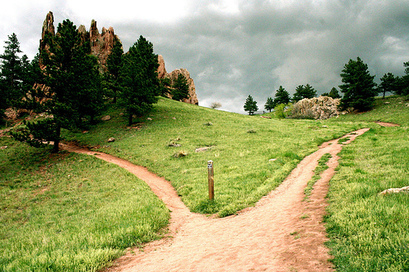 Decisions, decisions. Decisions, decisions. Life encompasses many things, but at its most basic level, it’s a series of choices. I'll give you an example: After I camp for a few days (an activity I'm quite fond of) my hands get rough, so when I embarked my adult wilderness career a year or so back, I wore "kid" gloves for certain tasks--tent building, fire maintaining, bag hauling. They prevented my hands from becoming rough or sore and protected me from the sort of hand injury that leads to a difficult camping experience. In those early days of my journeyman world, I was of a mindset that the goal in life was to always make things easier and more comfortable. But then my mindset changed. One night I was chopping a tomato and I ineptly cut a finger while wearing the gloves. It wasn't all that bad of a cut, but still, it raised a question: do I keep wearing the kid gloves for protection or do I give them up because they obviously can't protect me from everything? I never really wore my gloves all the time--I mean, what kind of weirdo walks around wearing leather work gloves everywhere they go? I also found that even if I wore them for certain, more arduous activities, my hands would inevitably become painful anyway. And as I'd just learned, if I was careless around a tomato I might cut right through the thin leather skin of my kid gloves anyway. So I stopped wearing them. I made a choice to live a little bit dangerously. I realized that no matter how many precautions I took, there would always be uncertainty, and no matter how many layers of protection I added, pain was inevitable. It was time to embrace the unknown and the pain that might develop from camping. Life is full of choices like this--simple actionable decisions between a perceived risk and an anticipated reward. You choose to stay in a job you hate instead of updating your resume. You choose to order the burger and fries instead of making a fresh salad. You choose to dilly dally on Facebook instead of writing. You choose to lose touch with a friend instead of picking up the phone. You choose to watch TV instead of going on a hike. Those are all decisions I've gotten wrong in life, but also decisions I've gotten right. Every day we get to decide which path to take. And who's really to say which is wrong and which is right? We're all very different and very infallible beings. Each one of us has to figure out the right path and the proper balance on our own. We each need to decide when it's right to wear the kid gloves of contentment, and when it's time to get out of our comfort zone and see what lessons that might bring. So I didn't wear the gloves, and as a result I learned to be more cautious--when I hammered in the stakes in around my tent, I did so thoughtfully--when I handled wood by the fire, I scanned for splinters first--when I carried heavy bags, I evened the weight so I wouldn't overburden one side. Giving up the gloves added some risk, but my mind picked up the slack, and I became a smarter camper. No one ever said life would be easy. Every day presents you with a series of choices, and each choice holds the potential for success, for failure, for a life lesson, and quite possibly for a paradigm shift. Take off the kid gloves, act a little rebellious, and feel the freedom it yields. |
Access Octomono Masonry Settings
blog searchauthorMy name is Jason Wise. Life's all about the journey, man. Find me on Instagram and Facebook. archives
May 2020
categories
All
subscribe |
